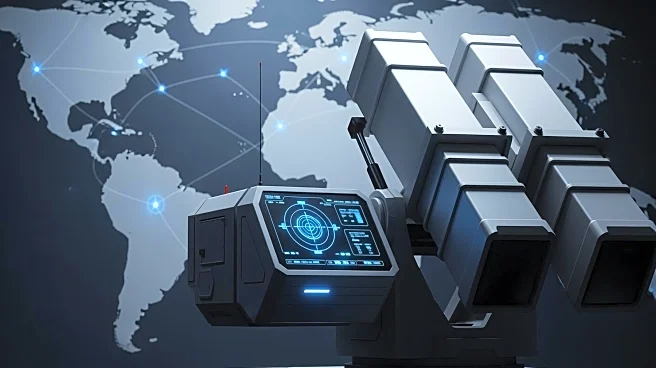What's Happening?
President Volodymyr Zelensky of Ukraine visited the White House to request long-range Tomahawk missiles from President Trump. These missiles have the capability to strike deep within Russian territory,
which Zelensky believes is necessary to push Russia harder to end its invasion of Ukraine. During the meeting, President Trump expressed optimism about brokering a cease-fire personally and showed reluctance to provide Ukraine with the powerful weapons. He emphasized his preference for resolving the conflict without the need for Tomahawk missiles, stating, 'We’d much rather have them not need Tomahawks.' The meeting was described as cordial, indicating improved relations between Trump and Zelensky after a previous encounter ended in a shouting match. Despite the positive atmosphere, Trump remains hesitant to increase pressure on Moscow, which continues to stall peace talks.
Why It's Important?
The request for Tomahawk missiles highlights the ongoing geopolitical tensions between Ukraine and Russia, with the U.S. playing a crucial role in the conflict's dynamics. The provision of such weapons could significantly alter the balance of power, potentially escalating the situation further. President Trump's reluctance to supply these missiles reflects a cautious approach to avoid exacerbating the conflict, while maintaining diplomatic relations with both Ukraine and Russia. The decision holds implications for U.S. foreign policy, as it navigates complex international relationships and the potential impact on global security. The outcome of this request could influence future U.S. involvement in Eastern European affairs and its stance on military aid.
What's Next?
President Trump plans to host a summit in Budapest to facilitate negotiations between President Zelensky and President Vladimir Putin. This summit aims to address the ongoing conflict and explore diplomatic solutions. The meeting could lead to a breakthrough in peace talks or further highlight the challenges in reaching a resolution. Stakeholders, including European allies and international organizations, will closely monitor the developments, as the U.S. decision on military aid could set a precedent for future engagements in the region. The outcome of the summit may also affect U.S.-Russia relations and influence broader geopolitical strategies.
Beyond the Headlines
The request for Tomahawk missiles underscores the ethical and strategic dilemmas faced by the U.S. in providing military support to allies. The decision involves weighing the risks of escalating military conflict against the benefits of supporting a sovereign nation under threat. Additionally, the situation raises questions about the long-term implications of U.S. involvement in foreign conflicts and the balance between diplomatic efforts and military interventions. The evolving dynamics between Ukraine, Russia, and the U.S. could lead to shifts in international alliances and influence global security policies.











